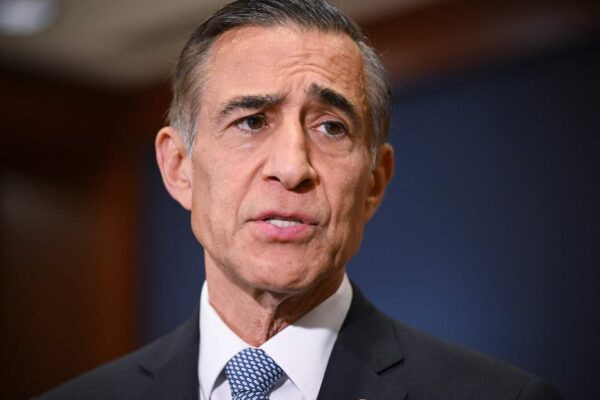
Mark Pomerantz, a former Manhattan prosecutor who led an investigation into Trump’s finances, invoked his Fifth Amendment rights during his deposition before the House Judiciary Committee on Friday.
The GOP-led committee is conducting oversight of Manhattan District Attorney Alvin Bragg’s “unprecedented indictment” of a former U.S. president.
Former President Donald Trump in March became the first-ever U.S. president to be criminally charged in a case brought by Bragg. Trump pleaded not guilty in April to the 34 felony counts (pdf) of falsifying business records.
As part of the House Judiciary Committee’s oversight, Pomerantz was subpoenaed to provide testimony. Bragg sued in an attempt to block the congressional subpoena, but a judge denied his request.
In Pomerantz’s opening statement on Friday, he called the GOP-led committee’s investigation “political theater.”
He said he was appearing to testify “as required” because “I respect the rule of law.”
“What I do not respect is the use of the Committee’s subpoena power to compel me to participate in an act of political theater,” he said in the statement. “This deposition is for show. I do not believe for a moment that I am here to assist a genuine effort to enact legislation or conduct legislative ‘oversight.’”
“Although the rule of law compels me to be here, it does not require that I play a substantive role in your theatrical production. Under the law, I can decline to answer your questions for several reasons.”
Pomerantz had pushed for an indictment against Trump after having led a probe into the former president’s hush money payments that took place prior to the 2016 election.
The former prosecutor left the Manhattan district attorney’s office in February 2022 because he disagreed with Bragg’s initial decision not to pursue a criminal case against Trump. Pomerantz later released a memoir about the case.
Three House GOP chairmen, including Judiciary Committee Chairman Jim Jordan (R-Ohio), mounted an investigation into Bragg’s office in March, at a time when Trump had suggested he’d be arrested soon, but before the felony charges were announced.
Pomerantz in his opening statement said he was instructed by Bragg’s office to maintain their “claims of privilege and confidentiality in order to protect the integrity of the pending prosecution and continuing investigation of Donald Trump.”
“I intend to honor the District Attorney’s request, and I will not answer questions to which the District Attorney objects,” said Pomerantz.
He also said he’s taking the Fifth because even though he had written and spoken about his own investigation into Trump, formal charges are now pending against Trump, which means “the circumstances have changed.”
“With formal charges now pending, the rule of law is best served if the merits of the case against Mr. Trump are litigated before the court that is hearing that case. This is neither the time nor the place for me to answer questions about the investigation or the pending indictment over the objection of the prosecutors,” he said.
“The charges against Mr. Trump should be heard and decided by a judge and a jury before politicians second-guess their merits or the decision to bring them. That’s how our system works. Those who claim that they respect the rule of law should wait for the courts to do their work,” Pomerantz added.
Pomerantz also explained that Bragg’s office, shortly before the publication of Pomerantz’s book, had warned him he could face criminal liability “if, among other things, I disclosed grand jury material or violated a provision of the New York City Charter dealing with the misuse of confidential information.”
He said a lawyer from Bragg’s office on April 19 told him that his book exposed him to criminal liability, even though he is “certain” that he “broke no laws.”
He said that under the Fifth Amendment, he’s not required to answer questions if the answers might be used against him in a criminal prosecution, and that the Fifth Amendment “is a protection for all citizens, including those who have done nothing wrong.”
He also said he is permitted under the rule of law to refuse to answer questions that “are not pertinent to a legitimate legislative action, or that seek information that is protected by the First Amendment’s guarantee of freedom of speech.”
“There may be other privileges, such as attorney-client privilege or the work product privilege, that are available for me with respect to [not answering] certain questions,” Pomerantz added.
“For all these reasons, I will not be answering questions that relate to my work in the DA’s office, my book, or public statements I have made in the past,” he wrote.
Pomerantz’s deposition ran for five hours.
“I’ve never had a more obstructive and less cooperative witness in my over 20 years in Congress,” Rep. Darrell Issa (R-Calif.), who is on the House Judiciary Committee, told reporters on Friday.
Issa said Pomerantz has “simply appeared” and seemed to have taken the Fifth on “every single question,” and “has answered no substantive questions whatsoever.” He also “clearly appears unwilling to answer any questions even about previous statements he’s made,” said Issa.


“We respect someone’s Fifth Amendment rights, but it’s very clear that this witness came with a clear intention of obstructing us,” Issa told reporters, adding, “When his opening statement becomes public, I think we’ll make it clear that he has disdain for this body and has no intention of answering any of our questions.”
Jordan, upon leaving the meeting room after the deposition, told reporters that he was “surprised at some of the answers,” but didn’t provide further details due to committee rules.
Pomerantz’s attorney, Ted Wells, told reporters that Pomerantz’s opening statement made it “very clear as to what happened.”
Rep. Dan Goldman (D-N.Y.) argued that Pomerantz shouldn’t have been forced to appear before the panel.
“Today’s deposition simply underscored that House Republicans’ investigation into Donald Trump’s criminal prosecution by a local district attorney’s office has no nexus to Congress’s jurisdiction and is simply an effort to abuse the official authority of Congress to undermine the rule of law, interfere in an ongoing prosecution of a private citizen, and harass and badger a public official carrying out his official duties,” he said in a statement to media outlets.




Discount Applied Successfully!
Your savings have been added to the cart.